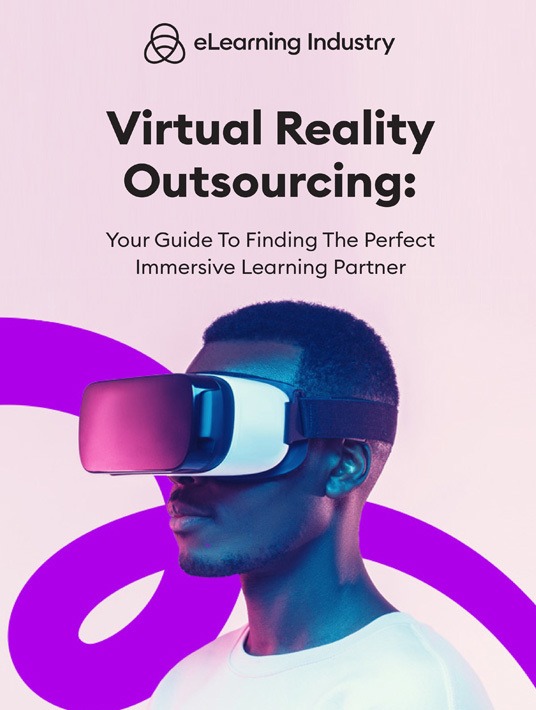How To Judge VR Training Vendor Suitability
One of the perks of hiring a VR training outsourcing partner is borrowing their expertise. They bring all their unique skills and experience to your project. But which qualifications should you look for? Are there particular talents that minimize outsourcing risks? And how do you even evaluate vendor competencies? After all, you need to make sure that your new virtual reality content provider is up to the task. Preferably, before contract negotiations. This guide answers all your pressing questions and more so that you can find the ideal VR training company the first time around, regardless of your outsourcing budget, objectives, or implementation timeline.

8 Qualifications To Look For In Your Next VR Training Vendor
1. Interpersonal Skills
Interpersonal skills are at the top of the list because everything hinges on communication and relationship building. Does the vendor actively listen to your needs? Are they able to articulate their ideas? Do they accept your feedback and incorporate it into the design? Your new outsourcing partner must have strong soft skills to achieve the best results. One of the best ways to evaluate interpersonal skills in action is to simply contact the vendor. Set up a meeting where you can discuss the project specs and see how they respond. Are they able to come up with fresh ideas and outline their plan? Do they listen to your requirements or cut you off each sentence?
2. Tech Know-How
Vendors should know their way around virtual reality training systems. It’s their job to keep up with modern technologies and VR training trends. Visit their landing page to gauge their level of tech know-how. There should also be a list of their go-to tools. While you’re there, check out their online portfolio. Which tools do they use and how do they use them? For example, the design is stunning and fully interactive, but performance behaviors are just an afterthought.
3. Graphic Design
Aesthetics and navigability are crucial VR training components. As such, the vendor must be adept at graphic design. They must be able to grab employees’ attention and facilitate knowledge transfer. Work samples and test projects are great ways to evaluate their design sensibilities. For example, hire them for a microlearning VR activity to see how they bring your vision to life. You can also ask them to provide a storyboard to dive deeper into their workflow and design inspirations.
4. Industry Expertise
Virtual reality training companies usually take on a variety of projects in different sectors. But industry expertise is crucial. They need to know how to overcome your training challenges and compliance issues, which requires insider knowledge. For example, VR sales training calls for certain skills and attributes, while safety training is all about regulations, company policies, and task protocols. Thus, the vendor must be familiar with your niche and training topic.
5. Time Management Skills
You have a limited time window to develop and implement virtual reality training in your organization. Especially if you’re racing the clock to meet compliance deadlines or prep your team for the “new normal.” As a result, VR training content providers require time management skills to avoid launch delays. They must also be able to set realistic milestones and provide regular updates so that you know what’s going on and can plan your roll-out accordingly. For instance, start marketing the brand-new VR training content weeks in advance to build the buzz.
6. PM Experience
Project management is a broad umbrella. It covers everything from problem-solving to conflict resolution skills. Content providers who specialize in VR training programs must have team leadership and a strong team dynamic. Above all, their manager needs to know how to use their talents and delegate tasks effectively. Discuss PM practices during your vendor meeting to feel out their framework. How many people will be involved in your project and who’s the main contact? What are their respective roles?
7. Creativity
Virtual reality requires a creative flair. Outsourcing companies must know how to blend real-world elements with fictional personas and scenarios to achieve the objectives. They also need to make the experience enjoyable for staffers so that they maximize training benefits. Creativity is a bit more challenging to assess because it takes many forms. However, online portfolios and case studies are good indicators. How did the vendor handle past projects? Did they approach problems with creativity and innovation? Or did they use the same approach time after time instead of venturing out of their comfort zone?
8. Strong Work Ethic
I’m not suggesting that the vendor should be available 24/7 and devote their life to your VR training project. However, they should have a strong work ethic and prioritize CX. For example, they meet with you one on one to discuss your concerns and questions or notify you a week in advance if they need more time for a deliverable. In short, your new outsourcing partner must be passionate about the project and your training goals instead of making you feel like you’re just another item on their to-do list.
Conclusion
Outsourcing usually involves compromise, to some extent. However, these qualifications are crucial for VR training success. You must be able to rely on your vendor to achieve the objectives and stick to the implementation schedule. They must also put their creative thinking caps on to devise innovative VR training interventions without going over budget. Finally, look for virtual reality training companies that treat you like a collaborative partner instead of an outsider. Their team must work with yours to create a winning employee development strategy.
Which virtual reality training provider has all the qualifications on this list? Search our online directory to find the best outsourcing partner for your project. There are even reviews that cover the pros, cons, and key selling points for each vendor.
Download the eBook Virtual Reality Outsourcing: Your Guide To Finding The Perfect Immersive Learning Partner for insider tips to launch an experiential learning program.






